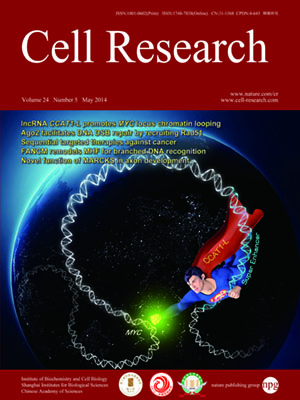
Volume 24, No 5, May 2014
ISSN: 1001-0602
EISSN: 1748-7838 2018
impact factor 17.848*
(Clarivate Analytics, 2019)
Volume 24 Issue 5, May 2014: 513-531 | Open Access
ORIGINAL ARTICLES
Human colorectal cancer-specific CCAT1-L lncRNA regulates long-range chromatin interactions at the MYC locus
Jian-Feng Xiang1, Qing-Fei Yin1, Tian Chen1, Yang Zhang1, Xiao-Ou Zhang2, Zheng Wu1, Shaofeng Zhang1, Hai-Bin Wang3, Junhui Ge3, Xuhua Lu3, Li Yang2 and Ling-Ling Chen1
1State Key Laboratory of Molecular Biology, Institute of Biochemistry and Cell Biology, 320 Yueyang Road, Shanghai 200031, China
2Key Laboratory of Computational Biology, CAS-MPG Partner Institute for Computational Biology, Shanghai Institutes for Biological Sciences, Chinese Academy of Sciences, 320 Yueyang Road, Shanghai 200031, China
3Changzheng Hospital, Second Military Medical University, 415 Fengyang Road, Shanghai 200003, China
Correspondence: Ling-Ling Chen,(linglingchen@sibcb.ac.cn)
The human 8q24 gene desert contains multiple enhancers that form tissue-specific long-range chromatin loops with the MYC oncogene, but how chromatin looping at the MYC locus is regulated remains poorly understood. Here we demonstrate that a long noncoding RNA (lncRNA), CCAT1-L, is transcribed specifically in human colorectal cancers from a locus 515 kb upstream of MYC. This lncRNA plays a role in MYC transcriptional regulation and promotes long-range chromatin looping. Importantly, the CCAT1-L locus is located within a strong super-enhancer and is spatially close to MYC. Knockdown of CCAT1-L reduced long-range interactions between the MYC promoter and its enhancers. In addition, CCAT1-L interacts with CTCF and modulates chromatin conformation at these loop regions. These results reveal an important role of a previously unannotated lncRNA in gene regulation at the MYC locus.
10.1038/cr.2014.35
FULL TEXT | PDF
Browse 2754


